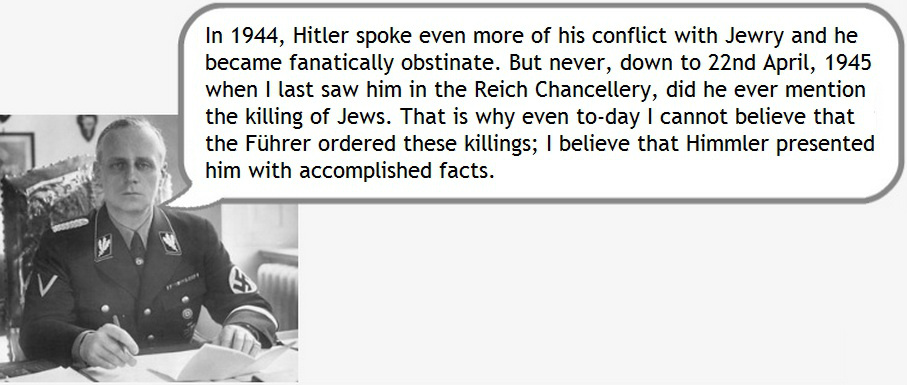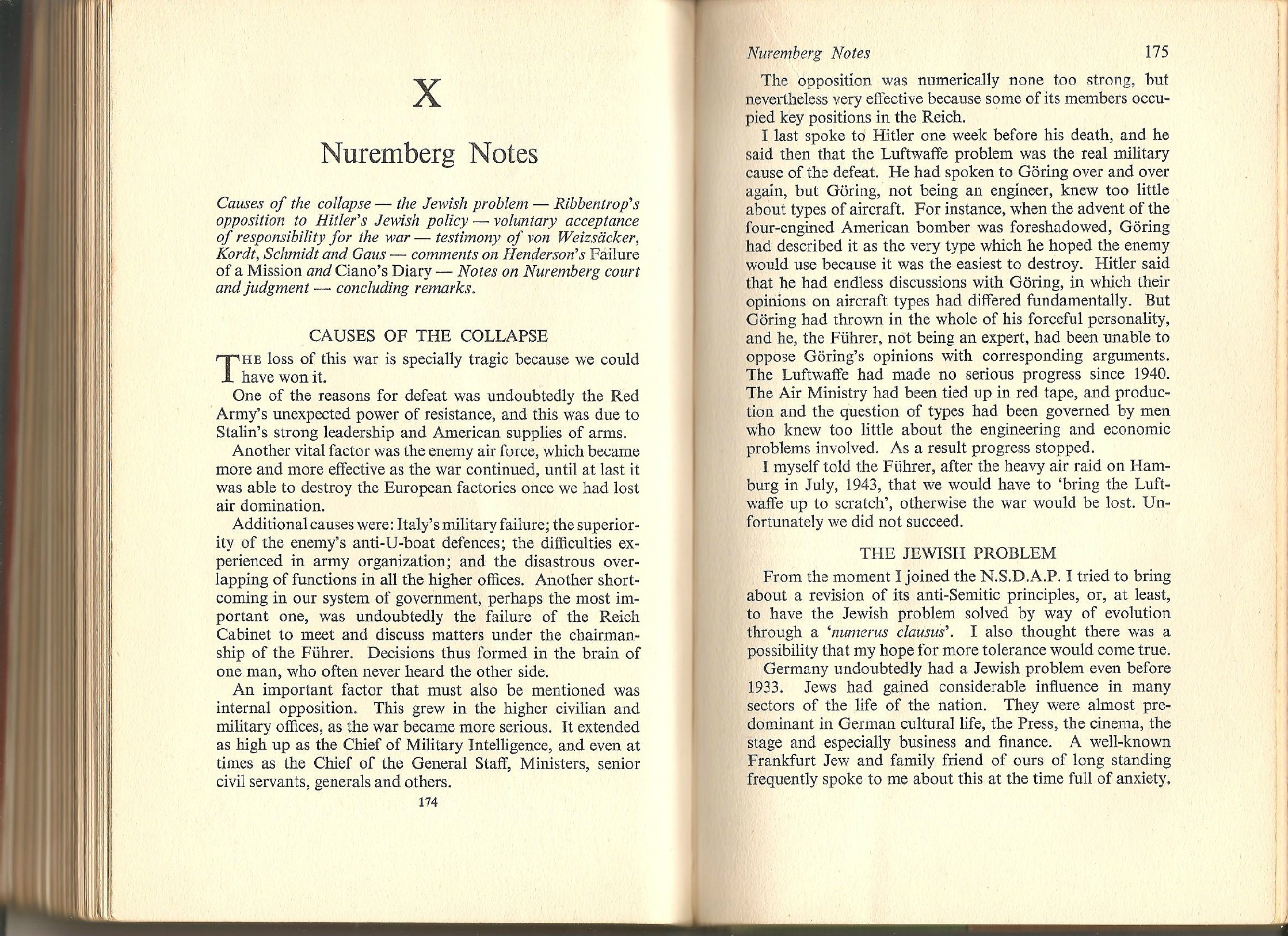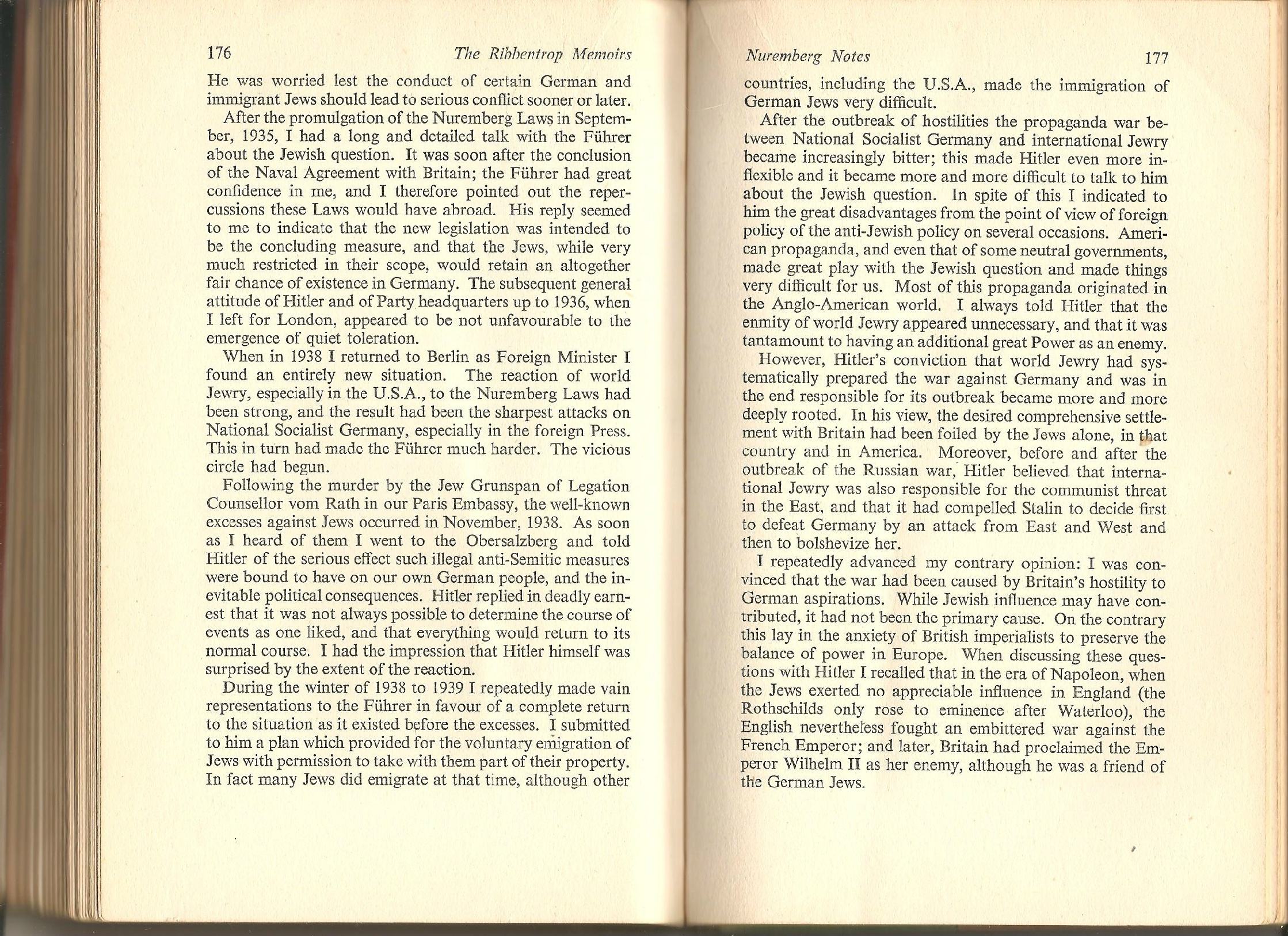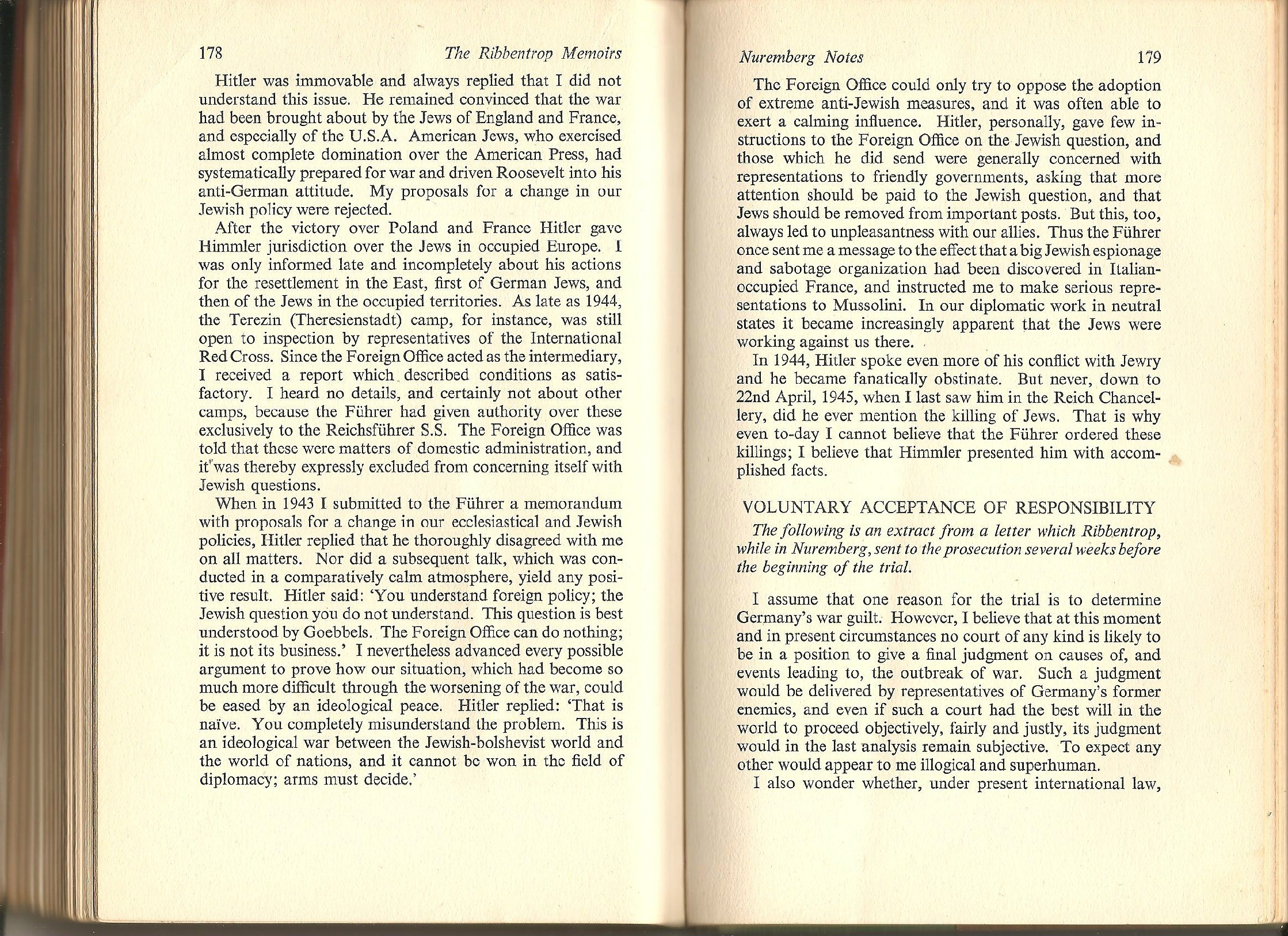[Note: As this article is reconstructed from a copy some
content/layout may vary from the original posting.]
Ribbentrop also denied Hitler ordered the Holocaust
Herman Goering denied even knowing about the mass executions of Jews
whilst he was on the stand at the main Nuremberg Trial, stating:
This I maintain, and the reason for this is that these
things were kept secret from me. I might
add that in my opinion not even the Führer knew
the extent of what was going on. This
is also explained by the fact that Himmler kept all
these matters very secret. We were never given figures
or any other details.
But Goering wasn't the only senior
member of the NSDAP who was of the opinion that
Hitler did not order the mass killing of Jews. I've recently obtained a
copy of the
memoirs of Joachim von Ribbentrop, the German Foreign Minister. He
too was
tried and sentenced to death
by hanging at Nuremberg, but in the last few
weeks of his
life, he wrote his memoirs which were published in
1953 and English in 1954.
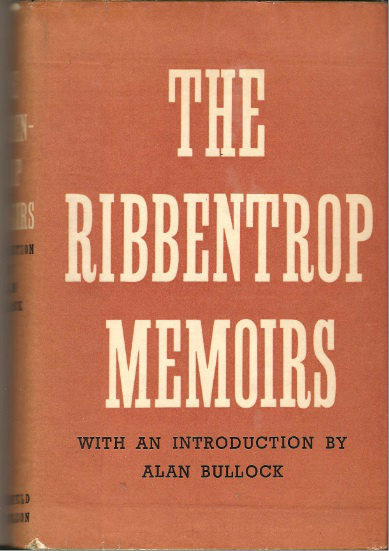
THE JEWISH PROBLEM
From the moment I
joined the N.S.D.A.P. I tried to bring about a revision of its
anti-Semitic principles, or, at least, to have the Jewish
problem solved by way of evolution through a 'numerus clausus'.
I also though there was a possibility that my hope for more
tolerance would come true.
Germany
undoubtedly had a Jewish problem even before 1933. Jews had
gained considerable influence in many sectors of the life of
the nation. They were almost predominant in German cultural
life, the Press, the cinema, the stage and especially
business and finance. A well-known Frankfurt Jew and family
friend of ours of long standing frequently spoke to me about
this at the time full of anxiety. He was worried lest the
conduct of certain German and immigrant Jews should lead to
serious conflict sooner or later.
After the
promulgation of the Nuremberg Laws in September, 1935, I had
a long detailed talk with the Führer about the Jewish
question. It was soon after the conclusion of the Naval
Agreement with Britain; the Führer had great confidence in
me, and I therefore pointed out the repercussions these Laws
would have abroad. His reply seemed to me to indicate that
the new legislation was intended to be the concluding
measure, and that the Jews, while very much restricted in
their scope, would retain an altogether fair chance of
Hitler and of Party headquarters up to 1936, when I left for
London, appeared to be not unfavourable to the emergence of
quite toleration.
When in 1938 I
returned to Berlin as Foreign Minister I found an entirely
new situation. The reaction of world Jewry, especially in
the U.S.A., to the Nuremberg Laws had been strong, and the
result had been the sharpest attacks on National Socialist
Germany, especially in the foreign Press. This in turn had
made the Führer much harder. The vicious circle had begun.
Following the
murder by the Jew Grunspan of Legation Counsellor vom Rath
in our Paris Embassy, the well-known excesses against Jews
occurred in November, 1938. As soon as I heard of them I
went to the Obersalzberg and told Hitler of the serious
effect such illegal anti-Semitic measures were bound to have
on our own German people, and the inevitable political
consequences. Hitler replied in deadly earnest that it was
not always possible to detirmine the course of events as one
liked, and that everything would return to its normal
course. I had the impression that Hitler himself was
surprised by the extent of the reaction.
During
the winter of 1938 to 1939 I repeatedly made vain
representations to the Führer in
favour of a complete return to the situation as it existed
before the excesses. I submitted to him a plan which
provided for the voluntary emigration of Jews with
permission to take with them part of their property. In fact
many Jews did emigrate at that time, although other
countries, including the U.S.A., made the immigration of
German Jews very difficult.
After the
outbreak of hostilities the propaganda war between National
Socialist Germany and international Jewry became
increasingly bitter; this made Hitler even more
inflexible and it became more and more difficult to talk to
him about the Jewish question. In spite of this I indicated
to him the great disadvantages from the point of view of
foreign policy of the anti-Jewish policy on several
occasions. American propaganda, and even that of some
netural governments, made great play with the Jewish
question and made things very difficult for us. Most of this
propaganda originated in the Anglo-American world. I
always told Hitler that the enmity of world Jewry appeared
unnecessary, and that it was tantamount to having an
additional great power as an enemy.
However,
Hitler's conviction that world Jewry had systematically
prepared the war against Germany and was in the end
responsible for its outbreak became more and more deeply
rooted. In his view, the desired comprehensive
settlement with Britain had been foiled by the Jews alone,
in that country and in America. Moreover, before and after
the outbreak of the Russian war, Hitler
believed that international Jewry was also responsible for
the communist threat in the East, and that it had compelled
Stalin to decide first to defeat Germany by an attack from
East and West and then to bolshevize her.
I repeatedly
advanced my contary opinion: I was convinced that the war
had been caused by Britain's hostility to German
aspirations. While Jewish influence may have contributed, it
had not been the primary cause. On the contary this lay in
the anxiety of British imperialists to preserve the balance
of power in Europe. When discussing these questions with
Hitler I recalled that in the era of Napoleon, when the Jews
exerted no appreciable influence in England (the Rothschilds
only rose to eminence after Waterloo), the English
nevertheless fought an embittered war against the French
Emperor; and later, Britain had proclaimed the Emperor
Wilhelm II as her enemy, although he was a friend of the
German Jews.
Hitler was
immovable and always replied that I did not understand this
issue. He
remained convinced that the war had been brought about by
the Jews of England and France, and especially of the U.S.A.
American Jews, who exercised almost complete domination over
the American Press, had systematically prepared for war and
driven Roosevelt into his anti-German attitude. My
proposal for a change in our Jewish policy were rejected.
After
the victory over Poland and France Hitler gave Himmler
jurisdiction over the Jews in occupied Europe. I
was only informed late and incompletely about his actions
for the resettlement in the East, first of German Jews, and
then of the Jews in the occupied territories. As
late as 1944, the Terezein (Theresienstadt) camp, for
instance, was still open to inspection by representatives of
the International Red Cross. Since the
Foreign Office acted as the intermediary, I received a
report which described conditions as satisfactory. I heard
no details, and certainly not about other camps, because the
Führer had given authority over these exclusively to the
Reichsführer S.S. (Himmler.) The Foreign Office wastold that
these matters of domestic administration, and it was thereby
expressly excluded from concerning itself with Jewish
questions.
When in 1943 I
submitted to the Führer a memorandum with proposals for a
change in our ecclesiastical and Jewish policies, Hitler
replied that he thoroughly disagreed with me on all matters.
Nor did a subsequent talk, which was conducted in a
comparatively calm atmosphere, yield any positive result.
Hitler said: 'You understand foreign policy; the Jewish
question you do not understand. This question is best
understood by Goebbels. The Foreign Office can do nothing;
it is not its business.' I nevertheless advanced every
possible argument to prove how our situation, which had
become so much more difficult through the worsening of the
war, could be eased by an ideological peace. Hitler
replied: 'That is naïve. This is an
ideological war between the Jewish-bolshevist world and the
world of nations, and it cannot be won in the field of
diplomacy; arms must decide.'
The Foreign
Office could only try to oppose the adoption of extreme
anti-Jewish measures, and it was often able to exert a
claming influence. Hitler, personally, gave few instructions
to the Foreign Office on the Jewish question, and those
which he did send were generally concerned with
representations to friendly governments, asking that more
attention should be paid to the Jewish question, and that
Jews should be removed form important posts. But this, too,
always led to unpleasantness with out allies. Thus the
Führer once sent me a message to the effect that a big
Jewish espionage and sabotage organization had been
discovered in Italian-occupied France, and instructed me to
make serious representations to Mussolini. In
our diplomatic work in neutral states it became increasingly
apparent that the Jews were working against us there.
In 1944, Hitler spoke
even more of his conflict with Jewry and
he became fanatically obstinate. But
never, down to 22nd April, 1945 when I last saw him in the
Reich Chancellery, did
he ever mention the killing of Jews. That
is why even
to-day I cannot believe that the Führer ordered these
killings; I
believe that Himmler presented him with accomplished facts.
------------------------------
"When a Jew, in America or in South Africa, talks to
his Jewish companions about 'our' government, he means the
government of Israel."
- David Ben-Gurion, Israeli Prime Minister

Viva Palestina!
Latest Additions
- in English
What is this Jewish
carnage
really about? - The background to
atrocities
Videos on Farrakhan, the Nation of Islam and Blacks and Jews

How Jewish Films and Television Promotes bias Against
Muslims
Judaism is Nobody's
Friend
Judaism is the Jews' strategy to
dominate non-Jews.
Jewish War Against
Lebanon!
Islam and Revolution
By Ahmed Rami
Hasbara -
The Jewish manual
for media deceptions
Celebrities bowing to their Jewish masters

Elie Wiesel - A Prominent False Witness
By Robert Faurisson
The Gaza atrocity 2008-2009

Iraq - war and occupation
Jewish War On
Syria!
CNN's Jewish version of "diversity"
- Lists the main Jewish agents
Hezbollah the Beautiful
Americans, where is your own Hezbollah?
Black Muslim leader Louis Farrakhan's Epic Speech in Madison Square
Garden, New York
 - A must see!
- A must see!
"War on Terror" -
on Israel's behalf!
World Jewish Congress: Billionaires, Oligarchs, Global Influencers for Israel
Interview with anti-Zionist veteran Ahmed Rami of Radio Islam
- On ISIS, "Neo-Nazis", Syria, Judaism, Islam, Russia...
Britain under Jewish
occupation!

Jewish World Power
West Europe
East Europe
Americas
Asia
Middle East
Africa
U.N.
E.U.
The Internet and
Israeli-Jewish infiltration/manipulations
Books
- Important collection of titles
The Judaization of
China
Israel: Jewish Supremacy in Action
- By David Duke
The Power of Jews in France
Jew Goldstone appointed by UN to investigate War Crimes in Gaza

The best book on Jewish Power
The Israel Lobby
- From the book
Jews and Crime - The archive
Sayanim - Israel's and Mossad's Jewish helpers abroad
Listen to Louis Farrakhan's Speech
- A must hear!
The Israeli Nuclear Threat
The "Six
Million" Myth
"Jewish History"
- a bookreview
Putin and the
Jews of Russia
Israel's attack on US warship USS Liberty
- Massacre in the Mediterranean
Jewish "Religion" - What is
it?
Medias
in the hands of racists
Strauss-Kahn - IMF chief and member of Israel lobby group

Stop Jewish Apartheid!
The Jews behind Islamophobia
Israel controls U.S. Presidents
Biden, Trump, Obama, Bush, Clinton...
The Victories of Revisionism
By Professor Robert Faurisson
The Jewish hand behind Internet
The Jews behind Google, Facebook, Wikipedia,
Yahoo!, MySpace, eBay...
"Jews, who want to be decent human beings, have to renounce being Jewish"
Jewish War Against Iran
Jewish Manipulation of World Leaders

Al Jazeera English under
Jewish infiltration

Garaudy's "The Founding
Myths
of Israeli Politics"
Jewish hate against Christians
By Prof. Israel Shahak
Introduction to Revisionist
Thought
- By Ernst Zündel
Karl Marx: The Jewish Question
Reel Bad Arabs
- Revealing the racist Jewish Hollywood propaganda
"Anti-Semitism" - What is it?
Videos
 - Important collection
- Important collection
The Jews Banished 47 Times in 1000 Years - Why?
Zionist
strategies
- Plotting invasions, formenting civil wars, interreligious strife,
stoking racial hatreds and race war
The International Jew
By Henry Ford
Pravda interviews Ahmed Rami

Shahak's
"Jewish History,
Jewish Religion"
The Jewish plan to destroy the Arab countries
- From the World Zionist Organization
Judaism and Zionism inseparable
Revealing photos of the Jews 
Horrors of ISIS Created by Zionist Supremacy
- By David Duke
Racist Jewish Fundamentalism
The Freedom Fighters:
 Hezbollah
- Lebanon
Hezbollah
- Lebanon
 Nation of Islam
- U.S.A.
Nation of Islam
- U.S.A.
Jewish Influence in America

- Government, Media, Finance...
"Jews" from
Khazaria stealing the land of Palestine
The U.S. cost of supporting Israel
Turkey, Ataturk and
the Jews

The truth about the Talmud
Israel and the Ongoing Holocaust in Congo
Jews DO control the media -
a Jew brags!
- Revealing Jewish article
Abbas - The Traitor
Protocols of Zion
- The whole book!

Encyclopedia of the
Palestine Problem
The
"Holocaust" - 120 Questions and Answers
Quotes
- On Jewish Power / Zionism
Caricatures / Cartoons

Activism!
- Join the Fight!


























